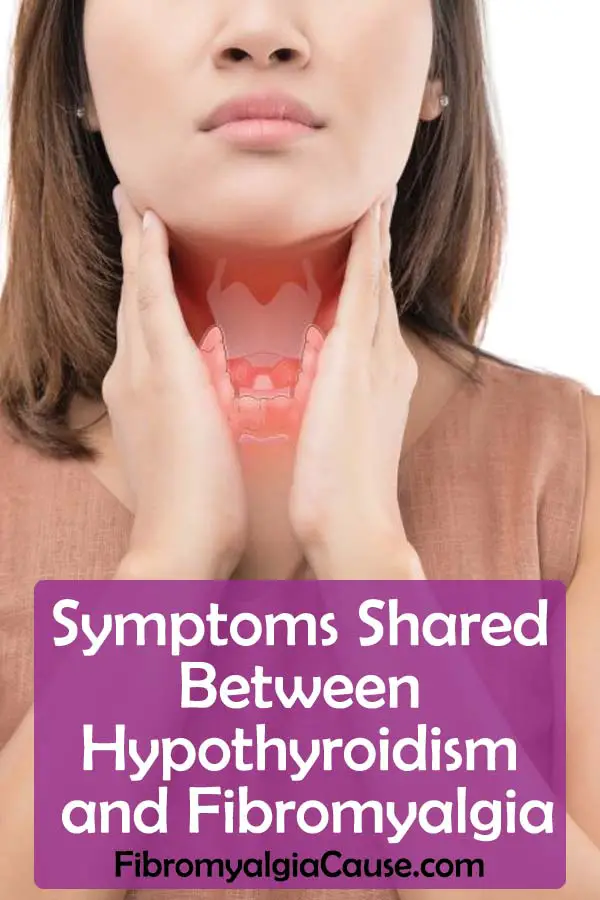One of the most frustrating things about having fibromyalgia is that the symptoms of the disease end up causing other problems in your body as well.
On top of that, you have symptoms of both disorders that end up overlapping, something making it difficult for you to determine the best course of action when it comes to your treatment plan and management of your symptoms.
Both hypothyroidism and fibromyalgia cause extreme exhaustion and mood disorders, which is why doctors have to go through a number of tests in order to see which one is going on (or if you have both).
Let’s take a closer look at hypothyroidism, and then let’s work to get an understanding of how hypothyroidism and fibromyalgia overlap.
What is Hypothyroidism?
Your thyroid gland is a very important part of your body. It produces a number of different hormones that help your body to do different things.
Those hormones make you do everything from creating metabolism, to pushing your sex drive, to doing any number of vital processes.
If your thyroid is not working as it should, there could be any number of complications that you can deal with, and it’s going to make it a lot harder for you to enjoy your life.
There are many different diseases that can happen in the thyroid. Hypothyroidism is one of the most common disorders that you have in your thyroid.
Hypothyroidism is when your thyroid is not working hard enough and, therefore, cannot produce the hormones that your body needs in order to function.
Because of this, the body is not going to be able to do what it needs to do, and you could end up gaining weight, becoming infertile, not growing correctly (if you’re still going through puberty) or dealing with any number of health issues.
Hypothyroidism is more common in women than men, and it usually occurs in women who are over the age of 60 unless another health problem is what caused it to happen in the first place.
What causes hypothyroidism?
There are a few things that can do it. Cancer cells and tumors can cause your thyroid to slow down and/or not work at all, thus resulting in surgery, chemotherapy, or any other number of treatments to have to occur in order for the patient to get back to full health.
There are a variety of autoimmune disorders that can also end up causing hypothyroidism, including Hashimoto’s Disease.
All of these disorders make your immune system attack your tissues, and in the case of hypothyroidism, they’re all attacking the thyroid glands.
There are, of course, other causes that can come into play as well. There is a certain genetic role that plays in causing hypothyroidism.
A bad diet can also cause it, as can radiation therapy, medication, and even treatment for hyperthyroidism, if it’s done incorrectly.
Anyone at any age can end up getting hypothyroidism, so it’s important to be able to understand and identify the symptoms so that it can be dealt with quickly and before it ends up with doing a lot of damage to the thyroid.
Symptoms Shared Between Hypothyroidism and Fibromyalgia
There are a lot of times where hypothyroidism and fibromyalgia get mixed up with each other. Why?
Because a lot of their symptoms overlap. The main symptoms that you see in both are the presence of fatigue and exhaust, muscle pain, inability to think straight or clearly, and mental health struggles such as anxiety and depression.
That being said, those with hypothyroidism are not going to deal with as much physical pain as those who have fibromyalgia.
The pain is merely a side effect of what is going on, instead of being the cause of it like hypothyroidism is.
Many times, you have to take a look at a blood test in order to get a better idea of what really is going on and as to whether or not it’s a thyroid issue or it’s an issue with your fibromyalgia.
All sorts of tests need to happen in order to pinpoint what is going on there, including hormone tests, adrenal stress tests, hair tests, and more.
These tests may be stressful to go through, but if it allows you to have proper diagnosis and treatment, you want to do them.
You can have both at the same time, and because they both compromise the adrenal glands, it’s actually quite common for those with fibromyalgia to have hypothyroidism at the same time.
Your oversensitivity and the fact that your immune system is going crazy and attacking your body can cause a lot of problems.
Because of this, it’s important that you make sure that you make the necessary lifestyle changes and get the treatment that you need in order for your body to function as it should.
So what do you do if you have both? One of the main things that you have to do is to make sure that you stay active.
Both diseases will worsen if you gain too much weight, so keeping your weight at bay and taking care of yourself is a big part of your treatment plan.
Some people suggest that you also take supplements, since many times, you’re not going to get the nutrients that you need in order for your body to heal and thrive.
Prescription medication is usually utilized in order to help thwart off some of the pain, especially in cases where you have both because the problems with hypothyroidism can exacerbate the pain that you are already coping with from your fibromyalgia.
Fending off these symptoms can be frustrating, but if you are diligent about it, you will find that it’s a lot easier for you to cope with everything that is going on.
That being said, it’s important that you have the right diagnosis first. Talk to your doctor if you suspect that there’s something else going on with your fibromyalgia or if you have any questions about these two disorders.
Follow Us on Pinterest
Pin it if you find it helpful and to Keep notified with our new articles

References:
http://thyroid.about.com/cs/fibromyalgiacfs/a/fibrothyroid.htm
http://www.healthline.com/health-blogs/hold-pause/fibromyalgia-hypothyroidism-and-menopause

2 Comments